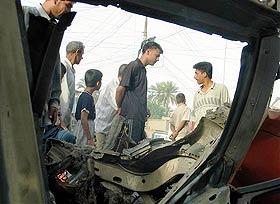Three suicide car bombings killed 20 people in northern Iraq on Thursday, including a top municipal council leader and a bodyguard of Iraq's Kurdish deputy prime minister, officials said.
Continuing violence during the past days has also claimed the lives of three children, a US soldier and a Sunni Muslim cleric, underscoring the rampant, random nature of an insurgency that has killed almost 800 people since the April 28 announcement of Iraq's new Shia-led government, according to an Associated Press count.
 At least 12 people were killed in a massive explosion targeting a restaurant in Tuz Khormato, 55 miles south of the northern city of Kirkuk, the Iraqi Defense Ministry said in a statement. Police Lt. Sabah Hidayat said at least 40 people were wounded.
At least 12 people were killed in a massive explosion targeting a restaurant in Tuz Khormato, 55 miles south of the northern city of Kirkuk, the Iraqi Defense Ministry said in a statement. Police Lt. Sabah Hidayat said at least 40 people were wounded.
The suicide bombing tore apart the town's Baghdad Restaurant, where bodyguards of Iraq's Kurdish deputy prime minister, Rowsch Nouri Shaways, were eating, said police Brig. Sarhad Qadre.
"I was sitting inside my restaurant when about six cars parked nearby and their passengers came inside and ordered food," said restaurant owner Ahmed al-Dawoudi. "Seconds later, I heard a big explosion and the restaurant was turned into twisted wreckage and rubble. Blood and pieces of flesh were everywhere."
Shaways was not at the restaurant at the time of the blast, which killed 12 diners, including one of his guards. At least 40 were wounded. Kurds, who want oil-rich Kirkuk to be part of their autonomous Kurdistan region, have been regularly targeted by insurgent attacks.
The blast set ablaze eight cars in the restaurant's parking lot, the focal point of a bloody, rubble-strewn scene that US and Iraqi police quickly cordoned off. Shards of glass, shoes and splattered breakfast meals covered the restaurant's floor as emergency workers raced around overturned tables and wooden chairs in a bid to treat the casualties.
In the northern city of Kirkuk, a suicide car bomber killed four Iraqi bystanders and wounded at least 11 others, said Dr. Bassam Mohammed of Kirkuk Emergency Hospital.
The explosion targeted a convoy of Toyota Land Cruisers carrying civilian contractors, damaging one of the vehicles but injuring none of its occupants, the US military said.
Further south in Baqouba, about 35 miles northeast of Baghdad, another suicide bomber killed four people, including Hussein Alwan al-Tamimi, 41, deputy head of Iraq's northeastern Diyala provincial council since January, police Col. Mudhafar Mohammed said. Three of his bodyguards also died in the attack on his convoy; four people were wounded.
A US soldier assigned to the Marines was killed when a roadside bomb struck the vehicle he was traveling in Wednesday near the volatile western Iraqi city of Ramadi, the military announced Thursday.
Another American soldier, attached to Task Force Liberty, died of non-battle-related wounds Wednesday in the northern city of Kirkuk, the military said. The incident is under investigation.
As of Thursday, at least 1,665 US military members have died since the Iraq war began in March 2003, according to an Associated Press count.
The US military also announced Thursday that an Iraqi civilian was killed and another wounded in a suicide bombing Wednesday near the village of Mishada, 20 miles north of the capital. Another suicide bomber tried to attack a US convoy nearby but failed.
A Sunni cleric, Imad al-Hayali, was "mistakenly" killed by an Iraqi soldier at a checkpoint in Latifiyah, south of Baghdad, police Lt. Adnan Abdullah said Thursday. Al-Hayali was shot Tuesday by soldiers who thought he was driving dangerously toward the checkpoint, Abdullah said.
A southern Baghdad mortar barrage late Wednesday killed 12-year-old Sabaa Haitham, her brother Sajjad, 10, their 8-year-old cousin Mina Mohammed Abid their uncle, Lu'ay Salih, in his mid-20s, hospital officials said.
In a bid to curb Iraq's insurgency, Shia leaders have started reaching out to Sunni Muslim insurgent groups believed responsible for multiple attacks.
Senior Shia cleric Hummam Hammoudi, chairman of a committee named by the National Assembly to draw up Iraq's constitution, said the Shia-led government has opened indirect communications with factions in the Sunni Arab-dominated insurgency and is trying to persuade them to lay down their arms.
"Some informal and limited contacts have been established with parties that we label as 'resistance,' so they can contribute to the drafting of the constitution," said Hammoudi, a senior member of Iraq's largest Shia political party.
Experts have long maintained it will be difficult to defeat the insurgency with military means alone. They stress the need for Sunni Arab participation in the political system, adequate reconstruction funds and job creation as key to weakening support for the rebels.
But the contacts did not include radical Islamic groups such as terrorist chief Abu Musab al-Zarqawi's al-Qaida in Iraq, which has been blamed for some of the worst bombings, kidnappings and other attacks.
(Associated Press writers Hamza Hendawi and Sameer N. Yacoub in Baghdad and Yahya Barzanji in Kirkuk contributed to this report)
AP Photo/Mohammed Adnan






 © 2025
© 2025